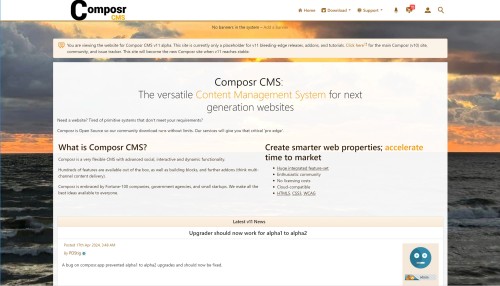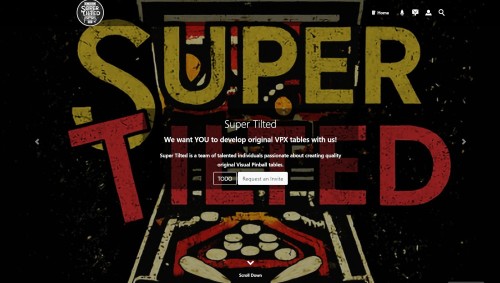Featured Sites: A-Z Index
H
Newest 10 Entries
| Question | How do I set the correct file permissions for Composr? |
|---|---|
| Answer | If you're using the quick installer, it will handle file permissions automatically. On a suEXEC-style server, default permissions (744 for directories and 644 for files) are usually sufficient. However, _config.php should have 600 permissions for security. Without suEXEC, specific directories (e.g., caches, uploads) and files (e.g., _config.php) require 777 (full access) or 666 (read/write) permissions. The fixperms.php script can automate this process on Linux and Windows. |
| Question | How do I install Composr on Linux? |
|---|---|
| Answer | After ensuring your web host meets the requirements and you have a database ready, you can install Composr on Linux using the following steps:
|
| Question | What are the prerequisites for installing Composr? |
|---|---|
| Answer | Before installing Composr, ensure your web host meets the minimum requirements. Familiarize yourself with your web host's control panel (e.g., Plesk, cPanel), which you'll use to manage databases, subdomains, and other settings. Gather your SFTP/FTP credentials (hostname, username, password), usually emailed upon signup. Set up a MySQL database and note its details: hostname (often 'localhost'), username, password, and database name. Ensure the database user has full read/write/administer access to the database. |
| Question | What tools are available for debugging Composr code? |
|---|---|
| Answer | Composr offers a code quality checker addon that helps identify various types of errors, including parser errors, run-time errors, and logical errors. This tool can significantly reduce debugging time and enhance code reliability. It is available through the testing_platform addon. |
| Question | What are some key coding standards in Composr? |
|---|---|
| Answer | Composr emphasizes clean, well-structured code with a focus on readability and maintainability. Key standards include proper indentation, consistent use of comments, and clear function headers with type definitions. Remember: beautiful code leads to better functionality and collaboration! |
| Question | Where can I find resources for learning PHP programming? |
|---|---|
| Answer | While Composr documentation doesn't cover basic PHP, resources like the official PHP documentation ( |
| Question | What is the purpose of the Code Editor? |
|---|---|
| Answer | The Code Editor is a web-based tool for editing Composr code files directly on the server. It requires password authentication and automatically manages overrides within _custom directories. To access it, go to yourbaseurl/code_editor.php. |
| Question | How can I export and import custom addons? |
|---|---|
| Answer | Composr allows exporting addons as TAR files, containing all necessary files and an addon.inf file for metadata. You can import these addons to share and reuse them across different Composr installations. To do this, make your necessary files for the addon in the Composr installation, and then go under Admin Zone > Structure > Addons > Export addon. You can select the relevant files for the addon, provide information about the addon, and then download the TAR file (which can then be imported on other Composr sites). |
| Question | Can you give an example of creating a new module? |
|---|---|
| Answer | Imagine creating a "Testing" module to manage collaborative testing:
|
| Question | What are the different ways to extend Composr functionality? |
|---|---|
| Answer | You can extend Composr through:
|
Top 10 Entries
| Question | Can I use the calendar as a personal diary and keep my entries private? |
|---|---|
| Answer | Yes. When adding an event to the calendar, you can choose to make it public or private. Private events are generally used when someone wants to use the calendar system as a diary. |
| Question | How can I set up reminders for events? |
|---|---|
| Answer | When adding or editing an event, you can enable reminders for yourself and specific user groups. You can also choose how much notice you want for each reminder. Members can subscribe for reminders on an individual event screen. They can also personalize their reminder settings, including removing reminders or having multiple reminders at different times. Members can also subscribe for notifications to specific event types to be notified whenever events under those types are scheduled. |
| Question | How can I schedule Commandr commands to run automatically? |
|---|---|
| Answer | To schedule commands, create an event with the "System command" event type. This option needs to be enabled in the configuration first. In the event details, you can specify either a URL for Composr to call or a snippet of Commandr code to execute. Be sure to disable the WYSIWYG editor for this type of event. You'll also need to have the system scheduler configured for the commands to run automatically. |
| Question | Can I add external feeds to the calendar? |
|---|---|
| Answer | Yes, you can add RSS or Atom feeds to your calendar. This lets you view time-based information from external sources alongside your calendar events. |
| Question | What do I do if a recurring event needs to be changed or skipped? |
|---|---|
| Answer | Composr has a "fixing an event" feature to handle changes to recurring events. This is useful if an event needs to be cancelled or rescheduled. You edit the event as if it were a new, standalone event and choose the "Edit with fixing past recurrences" option. This separates the past occurrences from the modified event, ensuring future recurrences reflect the changes. |
| Question | What is the "recurrence pattern" and how does it work? |
|---|---|
| Answer | The recurrence pattern is a powerful tool that defines how often an event repeats. While it might seem complex at first, it provides a lot of flexibility. Think of it as a binary code where each digit represents a time period (like a day or week). A "1" indicates the event occurs, and a "0" means it doesn't. This lets you create complex schedules like "every weekday" (daily with pattern 1111100 if it starts on a Monday) or "every other Tuesday" (weekly on Tuesday with the pattern 10). |
| Question | What are the different views available in the calendar? |
|---|---|
| Answer | The calendar has five views:
You can easily navigate between these views to get different levels of detail and focus on specific periods or events. |
| Question | How do I add events to the calendar? |
|---|---|
| Answer | You can add events in several ways:
Deleting events can be done at the bottom of the event's edit form. You have options for recurring events, such as editing/deleting the specific occurrence, editing/deleting future ones, or all of them. |
| Question | How do I categorize events? |
|---|---|
| Answer | You categorize events using "Event types". Composr provides default types like "Anniversary", "Appointment", "Birthday", "General", "Public Holiday", "Task", "Vacation", and the special "System command" for executing Commandr commands. You can also add your own custom event types to suit your specific needs, such as "Appraisal Session" for a business website. |
| Question | What is an "event" in the Composr calendar system? |
|---|---|
| Answer | An event is any entry in the calendar. Importantly, an event isn't limited to a single point or range in time. Events can recur based on a schedule you define. This makes them very flexible – they can represent anything from one-time appointments to recurring birthdays or even weekly team practices. |








